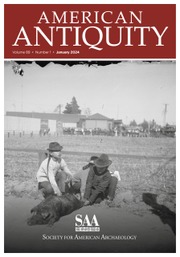This year I wanted to highlight each of the advisory editoral board members. In addition to those members covered in previous editor's corner including Stephen Acabado (UCLA), Sabrina Agarwal (UC Berkeley), Michael Blakey (William and Mary), Lewis Borck (University of Oklahoma, Norman), Craig Cipolla (Tufts) and Alan Farahani (Sciscope Solutions, Portland, Oregon), this editorial provides a bit about Ayana Omilade Flewellen, Maria Franklin, and Sara L. Gonzalez.
Ayana Omilade Flewellen received their PhD from the University of Texas at Austin in 2018. They were a President's Postdoctoral Fellow at the University of California, Berkeley, and an assistant professor at the University of California, Riverside. They are currently an assistant professor of anthropology at Stanford University, where their research focuses on public and community-engaged archaeology, historical archaeology, and maritime heritage conservation. Their research emphasizes Black Feminist Theory, as well as processes of identity formations, memory, and representations of slavery. They are outspoken about increased diversity and antiracism in archaeology and academia (Flewellen et al. Reference Flewellen, Dunnavant, Odewale, Jones, Wolde-Michael, Crossland and Franklin2021). They are currently working on a book entitled The Will to Adorn: Black Women and Sartorial Choice after Enslavement. They are a co-founder and current president of the Society of Black Archaeologists. They are involved with collaborative community-engaged projects, such as the Estate Little Princess Archaeology Project and Field School, where they are co-PI.
Maria Franklin received her PhD from the University of California, Berkeley, in 1997. She is currently a professor of anthropology and department associate chair at the University of Texas at Austin. Her research focuses on historical archaeology, particularly the archaeology of the African diaspora, where she centers race, gender, and feminist theories (Franklin Reference Franklin2001). She has previously worked on plantation-related archaeological sites and with African American descendant communities in Texas. More recently, she worked on a project with the Texas Department of Transportation in Bolivar, Texas, which engaged with local and descendant communities to gain a better understanding of the late nineteenth-century frontier town. She has been a long-time advocate for engagement with African American communities and increased representation within archaeology and anthropology (Flewellen et al. Reference Flewellen, Dunnavant, Odewale, Jones, Wolde-Michael, Crossland and Franklin2021; Franklin Reference Franklin1997).
Sara L. Gonzalez received her PhD from the University of California, Berkeley, in 2011. She is currently an associate professor of anthropology and adjunct associate professor of American Indian studies at the University of Washington. She is also the curator of archaeology at the Burke Museum of Natural History. Her research focuses on Indigenous and historical archaeology in the Pacific and California regions, archaeologies of colonialism, and tribal historic preservation. Her research integrates Indigenous knowledge and focuses on collaborative, community-based participatory research. Examples of such collaborative projects include the California Community Archaeology Project as well as the Kashaya Pomo Interpretive Trail Project at Fort Ross State Historic Park. Recently, she published a book about the various ways that Indigenous communities negotiated and survived settler colonialism in California (Lightfoot and Gonzalez Reference Lightfoot and Gonzalez2018), and she co-edited the Routledge Handbook of the Archaeology of Indigenous-Colonial Interaction in the Americas (Panish and Gonzalez Reference Panich and Gonzalez2021).


